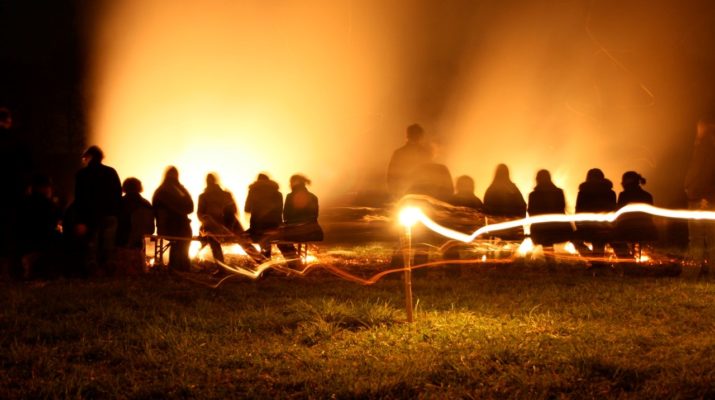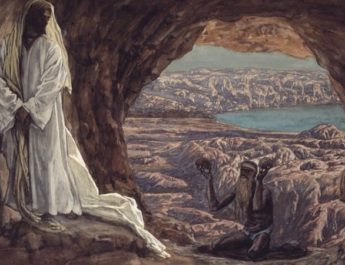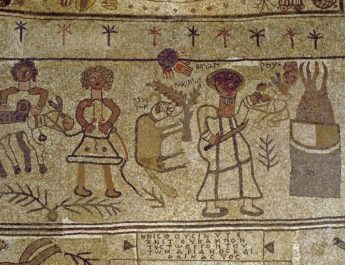Isaiah 62:1-7, 10-12
A Women’s Lectionary 8
1 For Zion’sI sake I will not keep silent,II
and for Jerusalem’sIII sake I will not rest,IV
I “Zion’s” = Tsiyyon. Related to tsyiyyun (signpost, monument); from tsavah (to charge someone, to command, order); from the same as tsiyyah (dryness drought); from a root meaning parched as desert, dry land. Zion can refer to a mountain in Jerusalem as well as another name for Jerusalem itself or the people.
II “keep silent” = chashah. 15x in OT. This is to be silent or not doing anything.
III “Jerusalem’s” = Yerushalaim. From yarah (to throw, shoot, be stunned; to flow as water so figuratively to instruct or teach) + shalam (to make amends, to be complete or sound). This is Jerusalem, dwelling of peace.
IV “rest” = shaqat. This is to be quiet, rest, calm, settle, be still, peace.
until her vindicationV shines out like the dawn,VI
and her salvationVII like a burningVIII torch.IX
V “vindication” = tsedeq. This is rightness, righteousness, vindication. It is everything that is just or ethical. That which is right in a natural, moral, or legal sense. It also includes just weights (i.e. true weights). Figuratively, this is justice, righteousness, equity – even prosperity.
VI “shines out like the dawn” = yatsa + nogah. Literally, “goes out as brightness.” Yatsa is to go or come out, bring forth, appear. It is to go out in a literal or figurative sense. Nogah is 19x in OT. From nagah (to shine – root may mean to glitter). This is light, radiance, being bright, sunshine.
VII “salvation” = yeshuah. From yasha (to deliver, defend, help, preserve, rescue, be safe. Properly, to be open, wide or free, which implies being safe. Used causatively, it means to free). This is salvation, deliverance, health, victory, prosperity.
VIII “burning” = ba’ar. This is to burn, consume, heat, remove. It can also be to consume by a fire or through eating, being brutish or wasting.
IX “torch” = lappid. 14x in OT. Root may mean to shine. This is torch, lamp, or flash of lightning.
2 The nationsX shall seeXI your vindication,
and allXII the kingsXIII your glory;XIV
X “nations” = goy. From the same root as gevah (the back, person, or body); related to gev (among); related to gaah (to rise up). This is nation or people. Often used to refer to Gentiles or foreign nations. It can also be used figuratively for a group of animals. This is where the Yiddish “goy” comes from.
XI “see” = raah. This is to see in a literal or figurative sense so stare, advise, think, view.
XII “all” = kol. From kalal (to complete). This is all or every.
XIII “kings” = melek. From malak (to be or become king or queen, to rise to the throne, to be crowned; by implication, to take counsel). This is king or royal.
XIV “glory” = kabod. From kabad (to be heavy, weighty, burdensome). This is weighty. Figuratively, glorious, abundant, riches, honor, splendor – a reference to one’s reputation or character. This word is often used to describe God and God’s presence.
and you shall be calledXV by a newXVI nameXVII
that the mouthXVIII of the LordXIX will give.XX
XV “called” = qara. This is to call or call out – to call someone by name. Also used more broadly for calling forth.
XVI “new” = chadash. From chadash (to renew or restore, to repair or rebuild). This is something fresh or new.
XVII “name” = shem. May be from sum (to put, place, set). This is name, fame, renown. A name was thought to indicate something essential about a person – something about their individuality. So, this word can also mean honor, authority, or character.
XVIII “mouth” = peh. This is mouth in a literal or figurative sense. So, more literally, it can be beak or jaws. More figuratively, it refers to speech, commands, or promises.
XIX “Lord” = YHVH. From havah (to be, become) or hayah (to come to pass, become, be). This is the name of the God of Israel, the self-existent and eternal one, the tetragrammaton. This pronunciation has been lost to time so “Lord” is generally used in its place.
XX “give” = naqab. This is to pierce, bore holes, puncture; to make a hole more or less forcefully. It is also to curse or libel. It can also mean to appoint, express, blaspheme, or name.
3 You shall beXXI a crownXXII of beautyXXIII in the handXXIV of the Lord,
and a royalXXV diademXXVI in the handXXVII of your God.XXVIII
XXI “be” = hayah. Related to “Lord” in v2. See note XIX above.
XXII “crown” = atarah. From atar (to surround or encircle to defend, protect, or attack; to crown in a literal or figurative sense). This is a crown or wreath. Figuratively, it can mean honor.
XXIII “beauty” = tipharah. From paar (to beautify or adorn, to gleam; can refer to showing honor or glorifying someone; also to boast or to shake a tree for harvest). This is beautiful, splendor, adornment, honor, bravery.
XXIV “hand” = yad. This is hand, ability, power. Hand in a literal sense, but also what one can do or the means by which one does it.
XXV “royal” = melukah. Related to “kings” in v2. From the same as melek (see note XIII above). This is kingship, kingdom, reign. It can also mean royalty.
XXVI “diadem” = tsaniph. 5x in OT. From tsanaph (to wrap or wind up). This is a diadem, turban, or other head wear.
XXVII “hand” = kaph. From kaphaph (to bend – from a root meaning curve or bend down). This is palm of the hand or sole of the foot, footstep, grasp. Figuratively, it can also mean power.
XXVIII “God” = Elohim.
4 You shall no more be termedXXIX Forsaken,XXX
and your landXXXI shall no more be termed Desolate;XXXII
but you shall be called My Delight Is in Her,XXXIII
and your land Married;XXXIV
for the Lord delightsXXXV in you,
and your land shall be married.
XXIX “termed” = amar. This is to say or answer.
XXX “Forsaken” = azubah. 5x in OT. From azab (to leave, forsake, permit). This word is forsakenness, desolation, emptiness.
XXXI “land” = erets. Root may mean to be firm. This is earth, ground, field land, or country.
XXXII “Desolate” = shemamah. From shamem (to be appalled, astonished; to stun or devastate, be destitute). This is a devastation, ruin, or waste.
XXXIII “My Delight is in Her” = Chephtsi-bah. 2x in OT. From chephets (a delight, care, or pleasure; what you desire or what is acceptable; a precious thing or something that one is thinking about); from chaphets (properly, inclined towards or bending to; figuratively, to desire, delight in, or be pleased with). This is Hephzibah, meaning “my delight is in her.”
XXXIV “Married” = baal. 15x in OT. This is to marry, master, become a husband, have power over.
XXXV “delights” = chaphets. Related to “My Delight is in Her” in v4. See note XXXIII above.
5 For as a young manXXXVI marries a young woman,XXXVII
so shall your builderXXXVIII marry you,
and as the bridegroomXXXIX rejoicesXL over the bride,XLI
so shall your God rejoiceXLII over you.
XXXVI “young man” = bachur. From bachar (to choose, appoint, try, excellent). This is choice, chosen, selected. It is a youth or young man.
XXXVII “young woman” = bethulah. This is virgin, maiden, or bride. Can also be used figuratively for a place.
XXXVIII “builder” = ben. From banah (to build or obtain children). This is son, age, child. It is son in a literal or figurative sense.
XXXIX “bridegroom” = chathan. From chathan (to intermarry, make an alliance through marriage, father-in-law, son-in-law, give one’s daughter in marriage). This is bridegroom, son-in-law. It is someone who is related through marriage. Figuratively, it can be a child who is circumcised.
XL “rejoices” = masos. 17x in OT. From sus (to rejoice, be glad; properly, to be bright or cheerful). This is delight, joy, something that causes joy or the feeling itself.
XLI “bride” = kallah. Related to “all” in v2. Perhaps from kalal (see note XII above). This is bride or daughter-in-law and the term is used before and after marriage.
XLII “rejoice” = sus. Related to “rejoices” in v5. See note XL above.
6 Upon your walls,XLIII O Jerusalem,
I have postedXLIV sentinels;XLV
XLIII “walls” = chomah. From the same as cham (father-in-law – one’s husband’s father; perhaps from a root meaning to join). This is a wall – a wall as used for protection.
XLIV “posted” = paqad. This is to attend to or visit – can be used for a friendly or violent encounter. So, it can be to oversee, care for, avenge, or charge.
XLV “sentinels” = shamar. This is to keep, watch, or preserve. It means to guard something or to protect it as a thorny hedge protects something.
all dayXLVI and all nightXLVII
they shall neverXLVIII be silent.
You who remindXLIX the Lord,
take no rest,L
XLVI “day” = yom. Root may mean being hot. This is the day in a literal or figurative sense. It can also mean birth, age, daylight, continually or other references to time.
XLVII “night” = layil. Properly, this refers to light twisting away. It is used for night or midnight. Figuratively, this can mean adversity.
XLVIII “never” = lo + tamid. Literally, “not always.” Tamid may come from a word that means to stretch. This word means an indefinite period of time. So, it could be regular or daily. It could also be constantly, continually, always, or perpetually.
XLIX “remind” = zakar. This is to remember, to mark something so that it can be recalled, to be mindful of, to mention.
L “take…rest” = domi. 4x in OT. From damah (to be silent, to cease, destroy, perish). This is a pause or rest. It could also be a cutting off.
7 and giveLI him no rest
until he establishesLII Jerusalem
and makesLIII it renownedLIV throughout the earth.LV
LI “give” = natan. This is to give, put, set, offer. It is to give literally or figuratively.
LII “establishes” = kun. Properly, this means in a perpendicular position. So, it is set up in a literal sense – establish, fix, fasten, prepare. In a figurative sense, it is certainty, to be firm, faithfulness, render sure or prosperous.
LIII “makes” = sum. Related to “name” in v2. See note XVII above.
LIV “renowned” = tehillah. From halal (to praise, be boastful). This is praise or a song of praise. It is to offer God a hymn, to boast in God. This shares a root with “hallelujah.”
LV “earth” = erets. Same as “land” in v4. See note XXXI above.
10 Go through,LVI go through the gates,LVII
prepareLVIII the wayLIX for the people;LX
LVI “go through” = abar. This is to pass over or cross over. It is used for transitions, whether literal or figurative. It can also mean to escape, alienate, or fail. This is the root verb from which “Hebrew” is drawn.
LVII “gates” = shaar. May be related to sha’ar (to calculate or reckon; may come from a root that means to open up or split). This is a gate, door, or other opening like a port.
LVIII “prepare” = panah. This is to turn, regard, appear, look, prepare.
LIX “way” = derek. From darak (to tread, march, to walk. Can also mean affixing a string to a box since one needs to step on it to bend it in the process; so also an archer). This is a road as a thing that is walked on. Can be used figuratively for the path that one’s life takes or how one chooses to live one’s life.
LX “people” = am. From amam (to darken, hide, associate; creating shadows by huddling together). This is people or nation. It can be used specifically for a tribe, collectively of troops or armies, or figuratively to refer to a flock of animals.
build up,LXI build up the highway,LXII
clearLXIII it of stones,LXIV
lift upLXV an ensignLXVI over the peoples.
LXI “build up” = salal. 12x in OT. This is to lift up, pile, build, make plain, extol, exalt.
LXII “highway” = mesillah. Related to “build up” in v10. From salal (see note LXI above). This is highway, path, step. It could be a course in a figurative sense or specifically a viaduct or staircase.
LXIII “clear” = saqal. Properly, this means being weighty. However, it is used for stoning someone (to death) or for removing stones.
LXIV “stones” = eben. This is a stone, weight, or mason. It is part of the word “Ebenezer.”
LXV “lift up” = rum. This is to rise or raise, to be high literally or figuratively. So it can also mean to exalt or extol.
LXVI “ensign” = nes. From nasas (to be high, easy to see, sparkling, to gleam, to raise a flag or signal). This is a flag, pole, sail, warning, signal, token.
11 LXVIIThe Lord has proclaimedLXVIII
to the endLXIX of the earth:
Say to daughterLXX Zion,
“See,LXXI your salvationLXXII comes;LXXIII
LXVII {untranslated} = hinneh. From hen (lo! Behold! If, though; an expression of surprise). This is to draw attention, show suddenness or surprise, or to emphasize the importance of the coming statement. See! Lo! Behold!
LXVIII “proclaimed” = shama. This is to hear, call, consent, or consider. It implies listening intelligently, giving attention, and, because of these two factors, obedience and action are often implied.
LXIX “end” = qets. From qatsats (to cut or chop off in a literal or figurative sense). This is outer border, end, or extremity. It can also mean infinite.
LXX “daughter” = bat. Related to “builder” in v5. From ben (see note XXXVIII above). This is daughter in a literal or figurative sense.
LXXI “see” = hinneh. Same as {untranslated} in v11. See note LXVII above.
LXXII “salvation” = yesha. Related to “salvation” in v1. From yasha (see note VII above). This is salvation, deliverance, rescue, safety, welfare, liberty.
LXXIII “comes” = bo. This is to enter, come in, advance, fulfill, bring offerings, enter to worship, attack. It can also have a sexual connotation.
LXXIVhis rewardLXXV is with him,
and his recompenseLXXVI beforeLXXVII him.”
LXXIV {untranslated} = hinneh. Same as {untranslated} in v11. See note LXVII above.
LXXV “reward” = sakar. From sakar (to hire, reward, earn). This is wages, payment, service, salary, worth, reward, or benefit.
LXXVI “recompense” = peullah. 14x in OT. From paal (to do, make, work, or accomplish; generally refers to regularly repeated or systematic action – to practice). This is work, deed, reward, or wages.
LXXVII “before” = paneh. Related to “prepare” in v10. From panah (see note LVIII above). This is face in a literal or figurative sense. It could be face, presence, anger, respect. It can also be used of God to indicate divine favor or presence.
12 They shall be called, “The HolyLXXVIII People,
The RedeemedLXXIX of the Lord”;LXXX
LXXVIII “Holy” = qodesh. This is set apart and so sacred. God is different from us and so God is holy/set apart. Things we dedicate to God’s service are set apart for God and so they, too, are holy, etc.
LXXIX “Redeemed” = gaal. This is to redeem someone or something according to kinship laws. So, it could be acting on a relative’s behalf to buy back their property, to marry one’s brother’s widow, etc. This could be more briefly translated as to redeem, acts as kinsman, or purchase. As a noun, it could be deliverer or avenger.
LXXX “Lord” = YHVH. Related to “Lord” in v2 & “be” in v3. From the same as YHVH (see note XIX above). This has the same meaning as “Lord” in v2, but with a different vowel pointing.
and you shall be called, “Sought Out,LXXXI
A CityLXXXII Not Forsaken.”LXXXIII
LXXXI “Sought Out” = darash. This is seek, ask, inquire, care for. Generally it means following in pursuit or following as part of a search, which implies seeking or asking. Also used specially to mean worship.
LXXXII “City” = iyr. From uwr (to awaken or wake oneself up). This can mean excitement in the sense of wakefulness or city. Properly, this is a place that is guarded. Guards kept schedules according to watches. This sense of the word would include cities as well as encampments or posts that were guarded.
LXXXIII “Forsaken” = azab. Related to “forsaken” in v4. See note XXX above.
Image credit: “At the Fire” by Christian Guenther, 2007.




